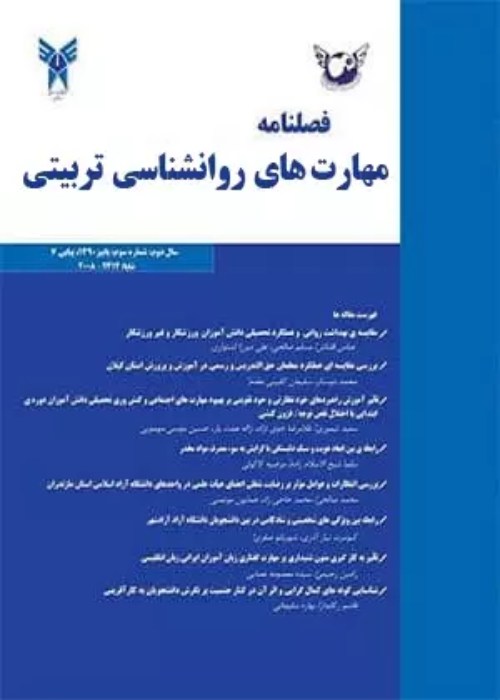فهرست مطالب
نشریه مهارت های روانشناسی تربیتی
سال دهم شماره 1 (پیاپی 37، بهار 1398)
- تاریخ انتشار: 1398/03/01
- تعداد عناوین: 1
-
مقایسه اثربخشی بازی های رایانه ای با بازی های سنتی ایرانی بر انعطاف پذیری شناختی و بازداری پاسخ دانش آموزان دارای اختلال یادگیری ویژه از نوع ریاضیصفحه 1
هدف از این پژوهش مقایسه اثربخشی بازی های رایانه ای با بازی های سنتی ایرانی بر انعطاف پذیری شناختی و بازداری پاسخ دانش آموزان دارای ناتوانی ریاضی است. روش پژوهش از نوع نیمه آزمایشی با طرح پیش آزمون-پس آزمون با گروه کنترل بود. جامعه آماری شامل کلیه دانش آموزان پایه چهارم تا ششم دبستان شهر تهران با ناتوانی ریاضی در سال تحصیلی 97-96 بودند. تعداد 30 نفر آزمودنی به شیوه نمونه گیری دردسترس و هدفمند انتخاب شدند و سپس به 3 گروه تقسیم شدند (یک گروه کنترل، یک گروه آزمایشی که تحت آموزش بازی های سنتی و یک گروه آزمایشی که تحت آموزش بازی رایانه ای شناختی کاپیتان لاگ نسخه 2014 قرار گرفتند). ابزارهای پژوهش آزمون هوش کودکان وکسلر تجدیدنظر شده WISC-R (1974)، آزمون ریاضی کی-مت (1976) جهت غربالگری اولیه و آزمون رایانه ای دسته بندی کارت های ویسکانسین (1948) جهت بررسی اصلی بودند. داده های براساس آمار توصیفی و آمار استنباطی (تحلیل کوواریانس چند متغیری مانووا) مورد تجزیه و تحلیلی قرار گرفت. بر اساس نتایج به دست آمده هر دو روش آموزش بازی های سنتی ایرانی و بازی های رایانه ای در افزایش انعطاف پذیری شناختی و بازداری پاسخ، دانش آموزان موثر بوده اند که دراین بین میزان اثربخشی بازی های رایانه ای، بیشتر از بازی های سنتی ایرانی است.
کلیدواژگان: بازی های رایانه ای، بازی های سنتی ایرانی، انعطاف پذیری شناختی، بازداری پاسخ، دانش آموزان دارای اختلال ریاضی
-
Comparison of the Effectiveness of Computer Games with Traditional Iranian Games on Cognitive Flexibility and Response Inhibiting of Students with Mathematical Learning DisorderPage 1
The purpose of this study was to compare the effectiveness of computer Games with traditional Iranian Games on cognitive flexibility and response inhibition of students with mathematical disabilities. The research method was quasi-experimental with pre-test and post-test design with control group. The statistical population consisted of all four to sixth grad elementary school students in Tehran who faced mathematical disability in the academic year of 2018-2019. A total of 30 subjects were selected through accessible and targeted sampling and then divided into 3 groups (a control group, a experimental group trained in traditional Games and one experimental group that was trained in Cognitive computer game as Captain’s Log). The research tools consisted of a revised Wechsler Vault Intelligence Test (WISC-R) (1974), K-Matt mathematical test (1976) for initial screening and a Wisconsin Card Classification Computer Test (1948). Finally, the data of each group were analyzed based on descriptive statistics and inferential statistics (Multivariate analysis of Manawa covariance). Based on the results, both traditional Iranian Games and computer Games have been effective in increasing the cognitive flexibility and response inhibition. The effectiveness of computer Games is more than Iranian traditional Games.
Keywords: Computer plays, Iranian Traditional Games, cognitive flexibility, response inhibition, Students with mathematical disorder


